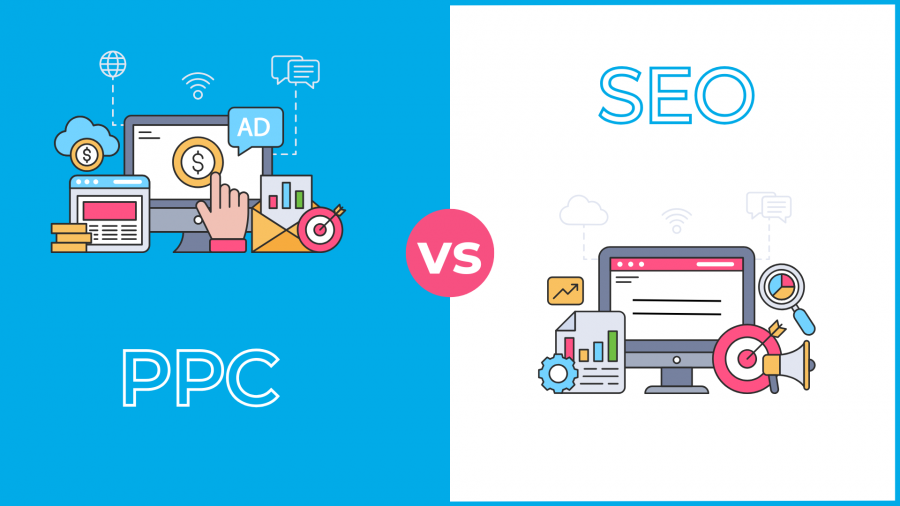In the world of digital marketing, navigating the various strategies to help improve your business can be daunting. Two of the most commonly discussed methods are Pay-Per-Click (PPC) advertising and Search Engine Marketing (SEM). While these terms are sometimes used interchangeably, they refer to distinct strategies with unique benefits and drawbacks. Understanding the differences between PPC and SEM is crucial for determining which approach is best for your business and budget.

Understanding PPC and SEM
Pay-per-click (PPC) Advertising is a model where businesses pay each time a user clicks on one of their ads. These ads typically appear at the top or bottom of search engine results pages (SERPs) and are marked as "sponsored" or "ad." PPC campaigns can also extend to platforms like social media or display networks.
Search Engine Marketing (SEM) is a broader term that encompasses all strategies used to increase visibility on search engines. While PPC is a component of SEM, SEM also includes search engine optimization (SEO) strategies. SEO involves optimizing your website and content to rank organically on search engine results without paid ads.
Pay-per-click Advertising
Pros:
- Immediate Results: PPC ads can drive traffic to your website almost instantly, making it a great option for businesses looking for quick results.
- Targeted Reach: PPC allows precise targeting based on demographics, location, keywords, and even specific times of the day.
- Measurable ROI: PPC platforms offer detailed analytics, allowing you to track the performance of your ads and adjust your strategy accordingly.
- Budget Control: You have complete control over your budget, allowing you to set daily or campaign-specific spending limits.
Cons:
- Cost: Depending on the competitiveness of your industry and keywords, PPC can become expensive, especially if not managed carefully.
- Temporary Results: Once you stop paying for ads, your visibility disappears. Unlike SEO, there’s no long-term benefit after you stop the campaign.
- Ad Fatigue: Over time, users might become desensitized to your ads, leading to declining click-through rates. xxxxxxxxxxxxxxxxxxxxxxxxxxxxxxxxxxxxxxxxxxxxxxxxxxxxxxxxxxxxxxxxxxxxxxxxxxxxxxxxxxxxxxxxxxxxxxxxxxxxxxxxxxxxxxx
Who Should Choose PPC?
PPC is ideal for businesses that need immediate visibility and have the budget to support ongoing campaigns. If you’re launching a new product, running a time-sensitive promotion, or operating in a highly competitive industry, PPC can deliver quick results. It's also a great fit for businesses that want to target specific audiences with precision, such as local businesses or e-commerce sites looking to drive conversions.
Search Engine Optimization
Pros:
- Long-Term Results: Unlike PPC, SEO efforts can result in sustained organic traffic long after the initial work is done.
- Cost-Effective: While SEO requires an investment in time and resources, the ongoing costs are generally lower than PPC.
- Credibility and Trust: Organic search results are often perceived as more credible by users, which can help enhance your brand’s reputation and build trust.
- Broad Reach: SEO can help you capture a wide audience at different stages of the buying journey, not just those ready to convert immediately.
Cons:
- Time-Consuming: SEO is a long-term strategy that requires patience. It can take months before you see significant results.
- Algorithm Dependence: Search engines frequently update their algorithms, which can impact your rankings, requiring ongoing optimization efforts.
- Complexity: SEO involves multiple factors, including on-page optimization, content creation, technical SEO, and link-building, making it complex and often requiring specialized knowledge.
Who Should Choose SEO?
SEO-focused SEM is perfect for businesses looking to build long-term brand authority and sustainable organic traffic. If your business has a longer sales cycle or if you're in a niche market where search engine visibility is crucial, investing in SEO can yield substantial long-term benefits. It's particularly effective for businesses that want to build credibility and trust with their audience over time, such as professional services, content-driven websites, or local businesses looking to dominate local search results.
Ultimately, the most effective approach often involves a combination of both strategies, leveraging the strengths of PPC for short-term success and SEO for sustainable growth. By understanding the benefits of each, you can craft a digital marketing strategy that aligns with your goals and delivers the best possible results.
Interested in getting started with a custom SEO strategy or PPC ad campaign?

